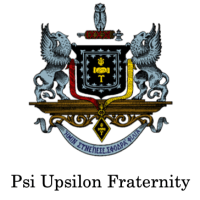
Graduate Recipients:
FISHFUND AWARD
Don Nguyen, Epsilon Nu ’20 (Michigan State)
LEWIS FINKELSTEIN, OMICRON 1983 AWARD
Jack Patterson, Tau Epsilon ’24, (Clemson)
HENRY B. POOR, GAMMA 1939 AWARD
Christopher Picard, Zeta ‘23 (Dartmouth)
Dylan Rykert, Upsilon ’24, (Rochester)
DR. TONY KREMER, OMICRON ‘87 AWARD
Tuna Ergan, Gamma Tau ‘23 (Georgia Tech)
Undergraduate Recipients:
J. Russell McShane, Delta ’32 Award
William Gordon, Pi ’25, (Syracuse)
Henry B. Poor, Gamma ’39 Award
Mark Bargout, ′25 Tau (Pennsylvania)
Skylar Fong, ′25 Tau (Pennsylvania)
Gardner A. Callanen, Psi ’29 Award
Andreas Matejka, Psi ’25 (Hamilton)
Robert W. Parsons, Xi ’22 Award
John (Jack) Vigue, X I ’25, (Wesleyan)
Earl D. Babst, Iota-Phi ’93
Sherry Li, Epsilon Iota ’26, (RPI)
Albert C. Jacobs, Phi ’21 Award
Arthur Anderson, Psi ’25 (Hamilton)
R. Timothy Leedy, Phi ’57 Award
V Verity, Gamma Tau ′25 (Georgia Tech)
Jonathan E. Persky, Omega ’85 Award
Jack Leuker, Omega ’25 (Chicago)
Robert W. Morey, Pi ’20 Award
Christian Thack, Pi ’25(Syracuse)
Benjamin T. Burton, Chi ’21 Award
Kurt Mueller, Upsilon ‘25, (Rochester)
Curtis J. Rettke, Eta ’84 Award
Brandon Dick, Sigma Phi ’25, (St. Francis)
R. DeWitt Wallace, Epsilon ’14 Award
Zane Abdel, Epsilon Nu ’25 (Michigan State)
William P. King, Omicron ’72 Award
Kevin Sanderson, Omicron ′26, (Illinois)
Jerome W. Brush, Jr., Delta Delta ’39 Award
Elisa Miller, Gamma Tau ′25 (Georgia Tech)
Eric W. Didul, Phi Beta ’90 Award
James Wang, Phi Beta ’25 (William and Mary)
For a list of all named scholarships and awards, and to support individual funds, please scroll down.
The award of Psi Upsilon Foundation scholarships is based upon demonstrated achievement in the pursuit of moral, intellectual and social excellence. Awards include a minimum grant of $1,500 to be used in meeting the recipient’s qualified educational expenses. Awards in amounts greater than the minimum grant may be provided based upon a demonstration of financial need. Applicants are not required to demonstrate financial need in order to qualify for a minimum grant.


Members of all chapters, provisional chapters, owl clubs, and colonies are eligible to apply and shall be given due consideration without regard to race, creed, ethnic origin, gender, sexual orientation, or other potentially discriminatory basis.
Named Scholarship Awards
These awards come from income generated from restricted funds:
Henry B. Poor, Gamma ’39 Award – unrestricted
Give to the Poor Scholarship Fund
Jonathan E. Persky, Omega ’85 Award – preference to an Omega undergraduate
Give to the Persky Scholarship Fund
Robert & Evelyn Kaiser Awards – restricted to Zeta undergraduates
Give to the Kaiser Education Fund
Lewis Finkelstein, Omicron ’83 Award – preference will be given to a brother from the Omicron Chapter first and those pursuing degrees in finance and accounting
Give to the Lewis Finkelstein Scholarship
These scholarships are funded each year by contributions to the Annual Fund:
J. Russell McShane, Delta ’32 Award – preference to a Delta undergraduate
Francis C. Hardie, Omicron-Zeta ’18 Awards (2) – unrestricted
Robert W. Parsons, Xi ’22 Award – unrestricted
Gardner A. Callanen, Psi ’29 Award – preference to a Psi undergraduate
Earl D. Babst, Iota-Phi ’93 Awards (2) – unrestricted
Albert C. Jacobs, Phi ’21 Award – unrestricted
R. DeWitt Wallace, Epsilon ’14 Award – unrestricted
Robert W. Morey, Pi ’20 Award – unrestricted
Benjamin T. Burton, Chi ’21 Awards (2) – unrestricted
Jerome W. Brush, Jr., Delta Delta ’39 Award – unrestricted
Gregg E. Rohlin, Phi ’83 Award – to a Phi undergraduate
R. Timothy Leedy, Phi ’57 Award – unrestricted
Curtis J. Rettke, Eta ’84 Award – to an Eta undergraduate
William P. King, Omicron ’73 Award – to an Omicron undergraduate
Salvatore L. Biardo, Omicron ’04 Award – to an Omicron undergraduate
Paul D. Friday, Theta Theta ’26 Award – unrestricted
Michael D. Oberg, Theta Theta ’88 Award – to a Theta Theta undergraduate
Eric W. Didul, Phi Beta ’90 Award – preference to a Phi Beta undergraduate
Delta Delta of Williams College Award(s) – to one or more sons or daughters of Delta Delta alumni attending Williams College
Psi Upsilon Foundation Grants

The Psi Upsilon Foundation makes grants to Psi Upsilon Fraternity to provide educational opportunities designed to reach every member in every chapter. These grants are funded by gifts to the Annual Fund and the income from restricted funds established for that purpose.
Psi Upsilon Foundation grants provide support for the Fraternity’s Chapter Leadership Program which includes:
Archons Academy
The Archons Academy is a three-day leadership seminar designed to help our undergraduate chief elected officers develop the skills necessary to become an effective leader. Participants have expressed overwhelming support for the opportunity to trade success stories and hear different approaches to resolving similar problems.
Topics include: goal setting, problem solving and conflict resolution, team building and motivation, leading an effective meeting and more.
This annual program is available to every archon from every chapter at no cost to the chapter.
Commitment to Excellence
Each chapter designs its own strategies and action plans to address its unique situation. Through retreats that examine personal values, leadership values and the values of Psi Upsilon Fraternity, alumni facilitators assist chapters in developing values-based strategies and act as mentors to individual members. Action plans with appropriate benchmarks and metrics establish chapter-specific goals that are monitored, reviewed and adjusted throughout the year.
GreekLifeEdu®
Psi Upsilon makes GreekLifeEdu® available to every member in every chapter. This online, interactive program is designed to prevent or eliminate alcohol-related problems, hazing and sexual assault, and to help students make safer and healthier decisions.
Leadership Institute
The Leadership Institute is held annually in conjunction with the Fraternity’s Convention and has become an integral part of the Fraternity’s effort to develop ethical leadership and promote moral, intellectual and social excellence. Topics include management, citizenship, community service, motivation, consensus building and academic development. The Leadership Institute provides undergraduates and alumni alike an opportunity to exchange ideas and solutions.
On Campus Consultations by Professional Staff
Written, Recorded & Video Educational Resources
